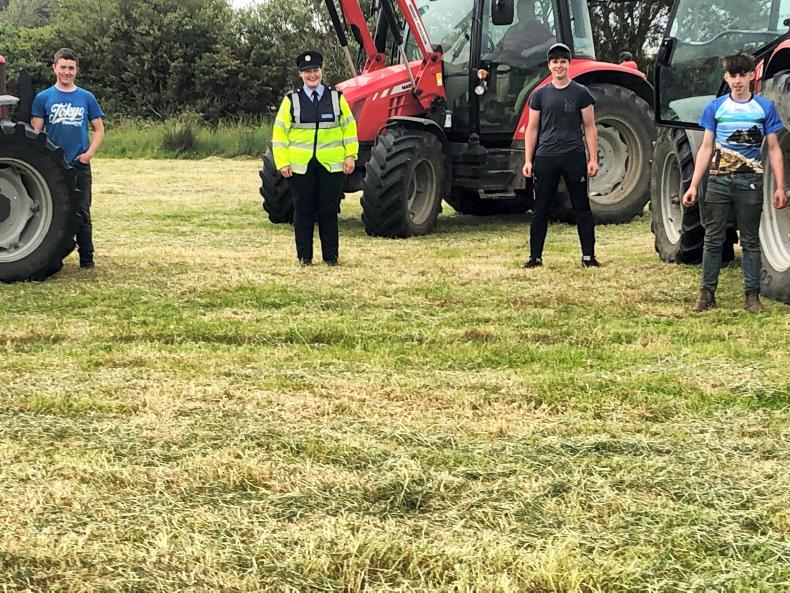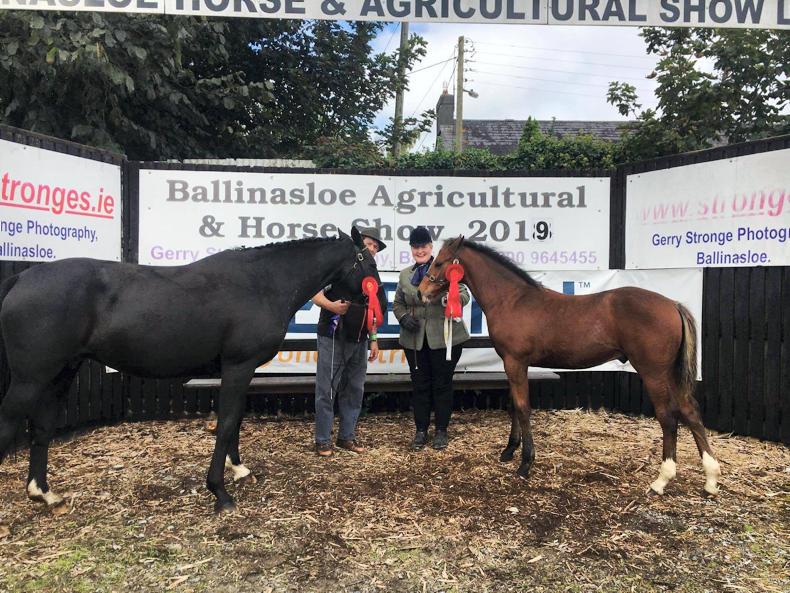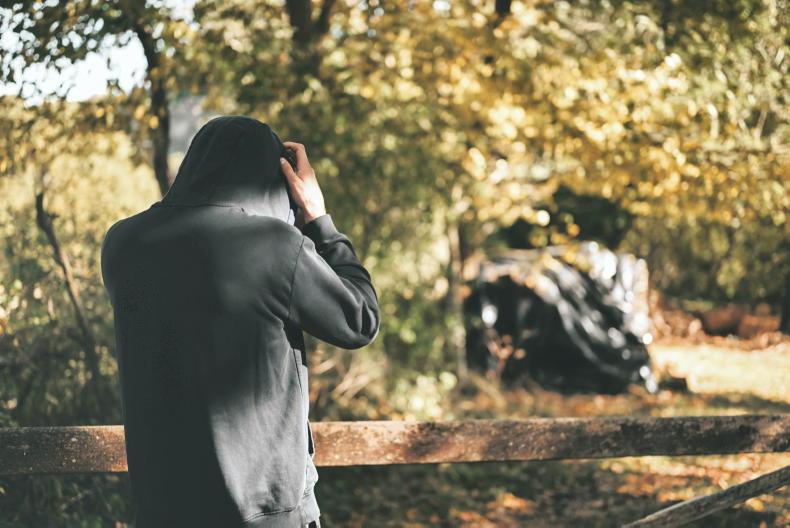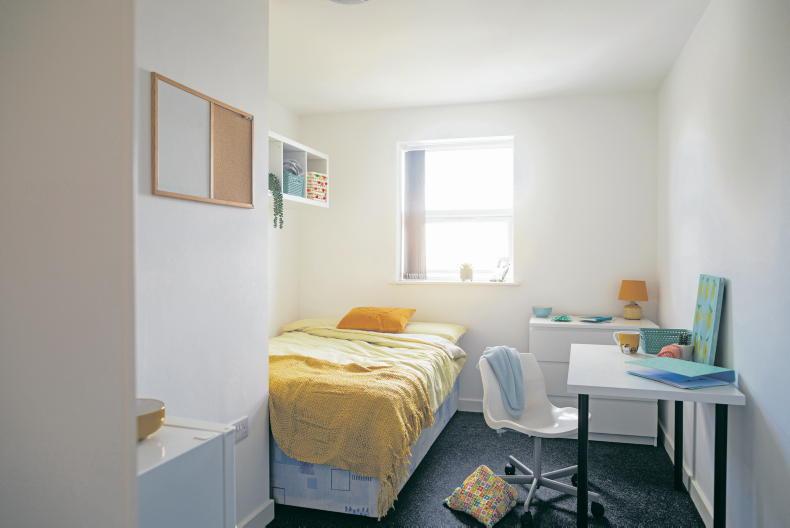Breaking the ice with a garda, where do you start? Atypically we started with horses.
Sergeant Edel Burke, Clare-based, Tipperary native, wants to breed “something that would go on”. They might have 40 cows but it’s her nice Vivant colt she is referring to. “He has a lovely temperament, he is out there and would eat out of your hand. We keep them for six months.” She laments the lack of shows this year
“The shows are great for the foals to be spotted. One year, I went to the Corofin Show and before I got home, one man had rang another man to tell him, ‘You need to go see this foal’ and he was bought that night.”
Her best day out was winning the three-year-old filly championship in Balmoral with Corgrigg Joules. The Northern show has been kinder to her “I don’t have much luck in Dublin and I can’t retire until I win a red rosette out of Dublin. That has eluded me.”
And with that, we move on past the horses and onto the day job. Or in this case, one of the day jobs.
Edel became a garda in 2001 and at 39 is glad of every year. “Great to get there. One of my colleagues and friend Michael O’Shea was planning his 40th when he lost his brave battle with cancer.”

Garda Edel Burke spoke with contractors following the release of TikTok videos showing dangerous stunts being carried out on tractors. She is here with (from left) Sean McNamara, Evan Coughlan and Jack Crowley of Fergal Crowley Agricultural Contractors, Co Clare.
Edel who is the local sergeant, covering from “Kildysart to Kilmihill to Kilrush to Kilkee and back to the coast”, has eight gardaí under her command and we query what has changed from pre-COVID-19 to now.
She explains that for the first few weeks, there were static checkpoints in Kilrush, 12 hours on the day shift and that was literally asking people where they were going.
But she said that you’d get the laugh from the public.
“Remember when you’d be going out and your mammy would say, ‘Where are you off to?” and you’d reply ‘Sure the gardaí wouldn’t ask me that’ and now they are asking you exactly that. In fairness, people took it really well. The good of it was that crime was reduced. Because if you were on the road, you were being met and you stuck out like a sore thumb.
“We have spit hoods now for protection and this is down to the drink a lot of the time. Drinking at home is a concern for us from the domestic side of our job and we would encourage anyone in a bad domestic situation to get in touch with us.
“We were briefed with guidelines – no direct contact when possible. On the road, engage with people and encourage them to go home and not to delay too long where they were going.
“The wearing of masks, that goes against the grain as it is hard to engage with someone that is wearing a mask. If two gardaí are driving along wearing masks, you get that double take. If we are out in the open, we are not too bad but if we have to go into a house, we would wear the masks.”
Some farmers were anxious about having anyone out to the farm due to the virus, she explains.

Matthew O'Meara Tommevara with Corgrigg Dancer and Edel with a Vivant Colt In Ballinasloe Agricultural Show 2019.
“I know one farmer who needed help calving a cow and he rang his local garda, who went out and helped him. He just didn’t want anyone coming in. I have been known to go and herd myself. Just two weeks ago with the high winds, I just happened to call to a farmer and he was up on a hill and he could neither go back nor go forward with the wind. He is in his 80s and was going out to check on his five cattle.”
With marts closed during the height of the crisis, Edel feared for the negative impact on farmer’s mental health.
“Not only would they meet people but they would get a good dinner at the mart. I believe that isolation and loneliness is the major issue for mental health in rural Ireland. Everyone has mental health, it’s just people don’t talk about it if it’s poor. You are just lucky if you are able to get out there and meet people.
However, Edel had recognised this as a problem long before COVID-19 and took it upon herself to organise rural mental health talks bringing in speakers such as farm accident survivor Peter Gohery and farmer Seamus Sherlock who battled through debt on the farm.
“Just for him to stand up in a room full of farmers and say, ‘I got into debt’ and give common sense advice like don’t bury the bills. You could see people going, ‘Yep I am in the same boat.
“His big thing was not to worry about what the neighbour is thinking about you, cause he is down the road, wondering what you are thinking about him. You both just need to get on with things.”
Six years later and the events Edel started in Clare have gone up the western seaboard.
“These events were garda-led and my colleagues would talk about crime and this gave people an opportunity to get feedback to the gardaí as some may be slow to ring us. They could give out all day but might not pick up the phone to us to let us know that there is an issue in their area.
Farm safety
Having renovated Dominic’s grand-parents’ house, they are the fifth family to live on the farmyard. With that though, Edel is very conscious of farm safety.
“Dominic lost a brother, Michael Francis, out on the road in 1984, we are passionate about farm safety for that reason. We are trying to engage with the contractors about those TikTok videos. They were really responsive. As soon as I said, ‘Can I come and chat with your drivers?’ they told me that they would be at such and such a farm. It was great to meet the younger drivers.
So that’s the day job, and the evening job? “I have three small ones; 10, eight and nearly four. Small man and two older girls. We have an au pair and the 40 cows. My husband Dominic is a garda as well. He is working in Milltown Malbay.
Irish Country Living can’t help but ask: “Are you his boss?” She laughs aloud: “Sort of, I suppose. “Myself and Dominic work opposite shifts so there is always one of us here on the farm with Dominic’s dad, Pat Curtin. We get the work ethic from him as he would put you to shame at 73 – he is tough. His mother Chrissy would have milked until she retired, they worked hard.
In a recent survey of the members of the Association of Garda Sergeants and inspectors, 94% said that with the easing of the COVID-19 restrictions it became more difficult to enforce the emergency regulations.
79% reported general policing duties being reduced (temporarily) due to restrictions of the movement of people and the holding of events and festivals. 87% welcomed the introduction of spit hoods as an additional layer of PPE to protect members under their supervision from deliberate coughing and spitting incidents. 92% reported high levels of positive interactions with the public during the emergency regulations for themselves and gardaí under their supervision.97% reported a positive response from the public to the role of members of An Garda Síochána in policing COVID-19.94% said that members should have access to priority testing for COVID-19 and also priority test results.
Breaking the ice with a garda, where do you start? Atypically we started with horses.
Sergeant Edel Burke, Clare-based, Tipperary native, wants to breed “something that would go on”. They might have 40 cows but it’s her nice Vivant colt she is referring to. “He has a lovely temperament, he is out there and would eat out of your hand. We keep them for six months.” She laments the lack of shows this year
“The shows are great for the foals to be spotted. One year, I went to the Corofin Show and before I got home, one man had rang another man to tell him, ‘You need to go see this foal’ and he was bought that night.”
Her best day out was winning the three-year-old filly championship in Balmoral with Corgrigg Joules. The Northern show has been kinder to her “I don’t have much luck in Dublin and I can’t retire until I win a red rosette out of Dublin. That has eluded me.”
And with that, we move on past the horses and onto the day job. Or in this case, one of the day jobs.
Edel became a garda in 2001 and at 39 is glad of every year. “Great to get there. One of my colleagues and friend Michael O’Shea was planning his 40th when he lost his brave battle with cancer.”

Garda Edel Burke spoke with contractors following the release of TikTok videos showing dangerous stunts being carried out on tractors. She is here with (from left) Sean McNamara, Evan Coughlan and Jack Crowley of Fergal Crowley Agricultural Contractors, Co Clare.
Edel who is the local sergeant, covering from “Kildysart to Kilmihill to Kilrush to Kilkee and back to the coast”, has eight gardaí under her command and we query what has changed from pre-COVID-19 to now.
She explains that for the first few weeks, there were static checkpoints in Kilrush, 12 hours on the day shift and that was literally asking people where they were going.
But she said that you’d get the laugh from the public.
“Remember when you’d be going out and your mammy would say, ‘Where are you off to?” and you’d reply ‘Sure the gardaí wouldn’t ask me that’ and now they are asking you exactly that. In fairness, people took it really well. The good of it was that crime was reduced. Because if you were on the road, you were being met and you stuck out like a sore thumb.
“We have spit hoods now for protection and this is down to the drink a lot of the time. Drinking at home is a concern for us from the domestic side of our job and we would encourage anyone in a bad domestic situation to get in touch with us.
“We were briefed with guidelines – no direct contact when possible. On the road, engage with people and encourage them to go home and not to delay too long where they were going.
“The wearing of masks, that goes against the grain as it is hard to engage with someone that is wearing a mask. If two gardaí are driving along wearing masks, you get that double take. If we are out in the open, we are not too bad but if we have to go into a house, we would wear the masks.”
Some farmers were anxious about having anyone out to the farm due to the virus, she explains.

Matthew O'Meara Tommevara with Corgrigg Dancer and Edel with a Vivant Colt In Ballinasloe Agricultural Show 2019.
“I know one farmer who needed help calving a cow and he rang his local garda, who went out and helped him. He just didn’t want anyone coming in. I have been known to go and herd myself. Just two weeks ago with the high winds, I just happened to call to a farmer and he was up on a hill and he could neither go back nor go forward with the wind. He is in his 80s and was going out to check on his five cattle.”
With marts closed during the height of the crisis, Edel feared for the negative impact on farmer’s mental health.
“Not only would they meet people but they would get a good dinner at the mart. I believe that isolation and loneliness is the major issue for mental health in rural Ireland. Everyone has mental health, it’s just people don’t talk about it if it’s poor. You are just lucky if you are able to get out there and meet people.
However, Edel had recognised this as a problem long before COVID-19 and took it upon herself to organise rural mental health talks bringing in speakers such as farm accident survivor Peter Gohery and farmer Seamus Sherlock who battled through debt on the farm.
“Just for him to stand up in a room full of farmers and say, ‘I got into debt’ and give common sense advice like don’t bury the bills. You could see people going, ‘Yep I am in the same boat.
“His big thing was not to worry about what the neighbour is thinking about you, cause he is down the road, wondering what you are thinking about him. You both just need to get on with things.”
Six years later and the events Edel started in Clare have gone up the western seaboard.
“These events were garda-led and my colleagues would talk about crime and this gave people an opportunity to get feedback to the gardaí as some may be slow to ring us. They could give out all day but might not pick up the phone to us to let us know that there is an issue in their area.
Farm safety
Having renovated Dominic’s grand-parents’ house, they are the fifth family to live on the farmyard. With that though, Edel is very conscious of farm safety.
“Dominic lost a brother, Michael Francis, out on the road in 1984, we are passionate about farm safety for that reason. We are trying to engage with the contractors about those TikTok videos. They were really responsive. As soon as I said, ‘Can I come and chat with your drivers?’ they told me that they would be at such and such a farm. It was great to meet the younger drivers.
So that’s the day job, and the evening job? “I have three small ones; 10, eight and nearly four. Small man and two older girls. We have an au pair and the 40 cows. My husband Dominic is a garda as well. He is working in Milltown Malbay.
Irish Country Living can’t help but ask: “Are you his boss?” She laughs aloud: “Sort of, I suppose. “Myself and Dominic work opposite shifts so there is always one of us here on the farm with Dominic’s dad, Pat Curtin. We get the work ethic from him as he would put you to shame at 73 – he is tough. His mother Chrissy would have milked until she retired, they worked hard.
In a recent survey of the members of the Association of Garda Sergeants and inspectors, 94% said that with the easing of the COVID-19 restrictions it became more difficult to enforce the emergency regulations.
79% reported general policing duties being reduced (temporarily) due to restrictions of the movement of people and the holding of events and festivals. 87% welcomed the introduction of spit hoods as an additional layer of PPE to protect members under their supervision from deliberate coughing and spitting incidents. 92% reported high levels of positive interactions with the public during the emergency regulations for themselves and gardaí under their supervision.97% reported a positive response from the public to the role of members of An Garda Síochána in policing COVID-19.94% said that members should have access to priority testing for COVID-19 and also priority test results. 









SHARING OPTIONS